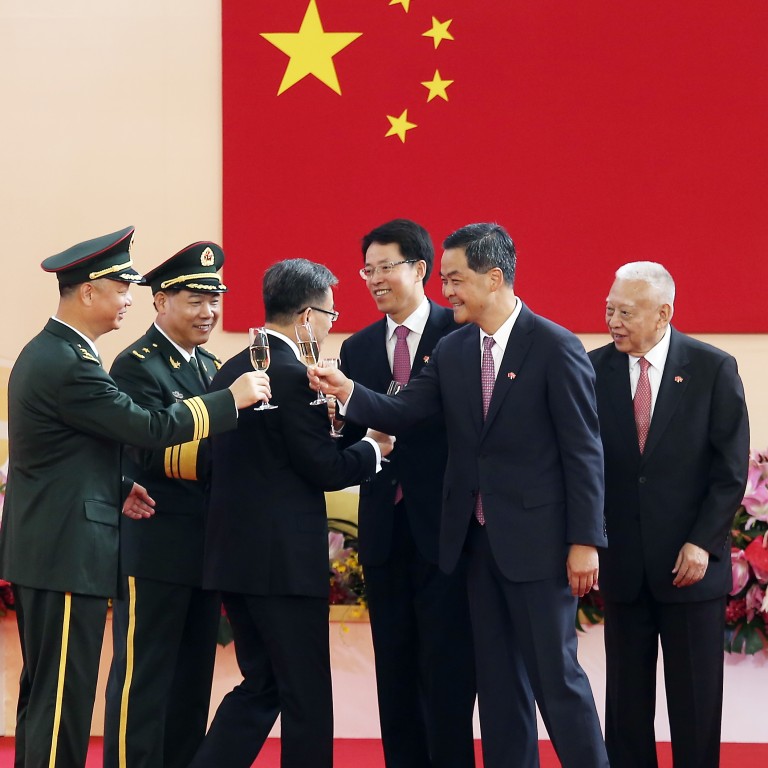
Update | ‘Hong Kong leader is above the executive branch, legislature and courts’, says Beijing’s liaison chief
Controversial words by director of liaison office effectively end the notion of separation of powers in the city and spark political row
Beijing's top official in Hong Kong has provoked a fresh political row by giving the city's top leader a position of authority over the executive, the judiciary and the legislature - effectively ending the notion of separation of powers in the city.
The comments yesterday from Zhang Xiaoming , chief of the central government's liaison office in Hong Kong, sparked an immediate backlash from critics who accused Beijing of redefining the scope and status of the city's chief executive.
The concept of the separation of powers was applicable only to sovereign states, Zhang said at a function to mark the 25th anniversary of the Basic Law, Hong Kong's mini-constitution.
“The chief executive’s dual responsibility [to both Hong Kong and Beijing] means he has a special legal position which is above the executive, legislative and judicial institutions,” Zhang said during his 26-minute speech in the morning, in his latest politically sensitive comments. The Basic Law is Hong Kong's mini-constitution.
Zhang also says Hong Kong is a jurisdiction directly under the central government, with the appointed chief executive as the core, in an “executive-led, judicially independent political system”.
“The chief executive’s power is not limited to leading the Hong Kong administration, but has a dual role – [as] head of the Hong Kong government and also the head of the Hong Kong special administrative region. He has responsibility towards both the Central People’s Government and to Hong Kong,” he explained.
Zhang added: “Hong Kong is not a political system that exercises the separation of powers; not before the handover, not after the handover”.
He said separation of powers “is usually established in sovereign states”, and so it is “at best” only a reference for Hong Kong.
Alan Leong Ka-kit, of the Civic Party, interpreted these comments as Beijing sending a message that Leung should be put on a pedestal “like an emperor”, and that legislative and judiciary systems cannot keep his power in check or keep him accountable.
Lee Cheuk-yan, chairman of the Labour Party, another pro-democracy group, said: “In the long run, how would Hongkongers have faith in the Basic Law, whose meaning has always been changing?”
However, pro-Beijing figures sought to alleviate grave concerns.
Lau Siu-kai, vice-chairman of the Chinese Association of Hong Kong and Macau Studies, a top official think tank, says the chief executive is not exempt from the checks and balances of the judiciary and legislature, despite Zhang’s statement.
“From the mainland’s perspective, it is a separation of powers under the leadership of the executive. The three powers are not equally important and do not share the same status,” Lau said.
“Under the Basic Law, the executive, legislature and judiciary have their own powers and duties. But the chief executive’s position is supreme.”
According to the Basic Law, the chief executive's powers and functions include signing bills passed by the Legislative Council and promulgating laws, to appoint or remove judges of the courts at all levels in accordance with legal procedures, and to decide on government policies and to issue executive orders.
It states that he or she is "accountable to the Central People's Government and the Hong Kong Special Administrative Region in accordance with the provisions of the Basic Law".
Article 64 of that law says that the executive branch "must abide by the law and be accountable to the Legislative Council of the region".
According to Article 85, meanwhile, Hong Kong's courts "shall exercise judicial power independently, free from any interference. Members of the judiciary shall be immune from legal action in the performance of their judicial functions".
Legco, it states, has the power to introduce bills, endorse the appointment and remove of judges in the Court of Final Appeal and the Chief Judge of the High Court, and to file a motion charging the chief executive with serious breach of law or dereliction of duty in a process that can lead to impeachment after an investigation by the judiciary.

